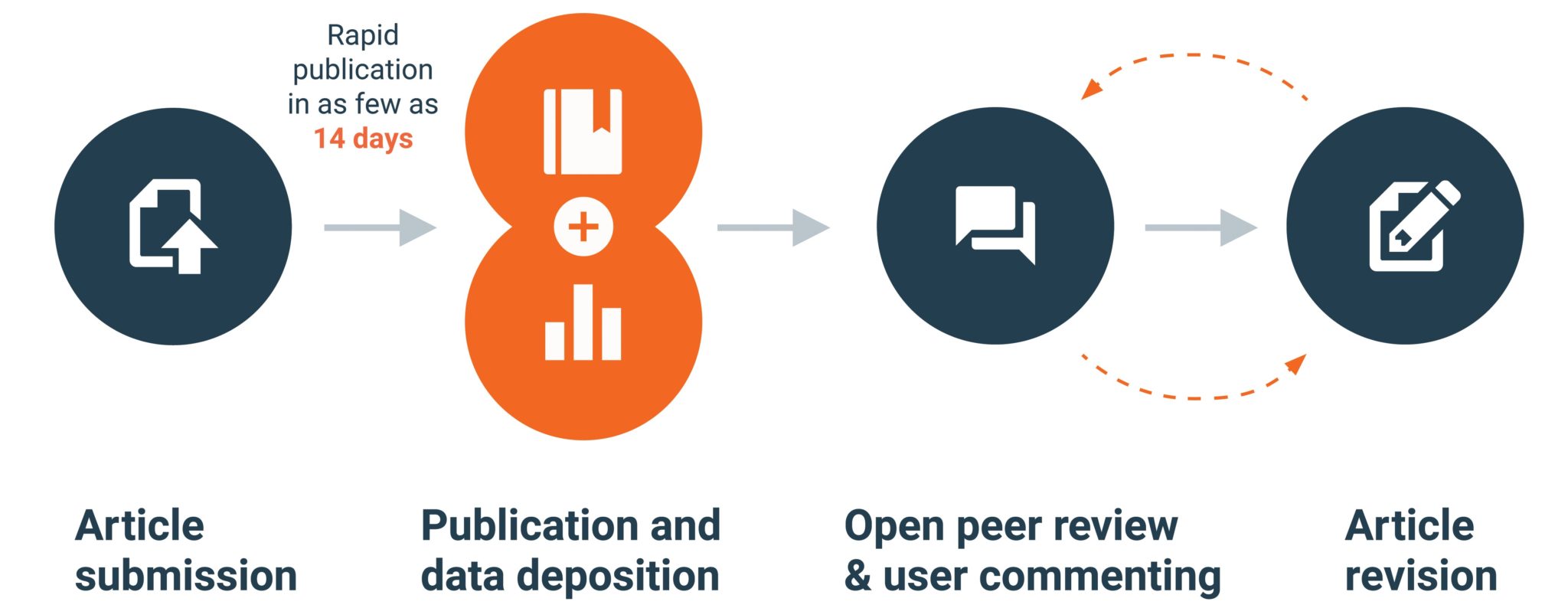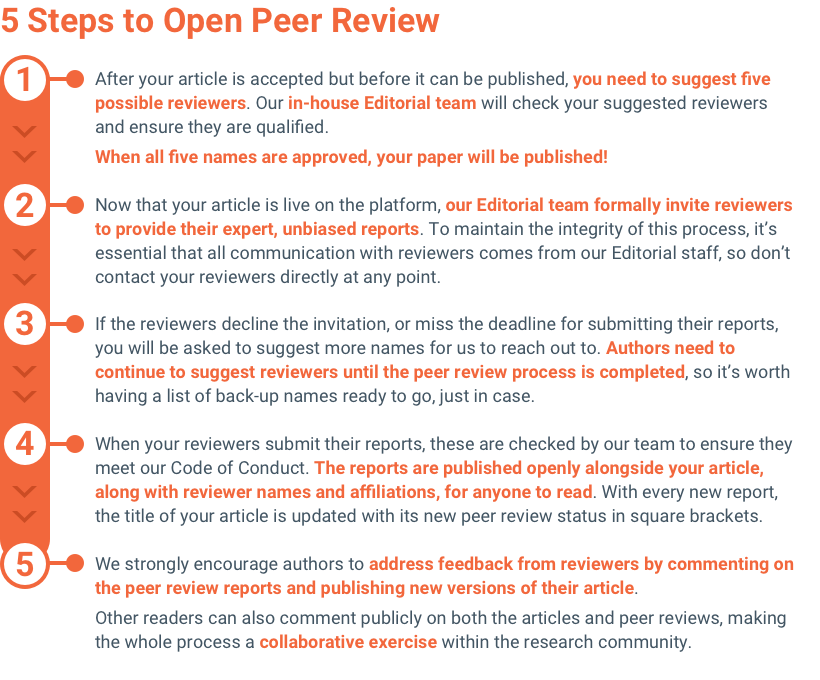Open peer review
Everything you need to know about the innovative F1000Research publication model
Think you know peer review? Think again.
Traditional closed peer review typically follows a single- or double-blinded process. This allows journal editors and reviewers to act as curators of knowledge, deciding what research is published where.
At F1000Research, we do things differently.
As pioneers in open research, we are proud to be the first publisher to offer a fully open and transparent post-publication peer review process. Our innovative model puts transparency center-stage, so that peer review becomes a constructive, collaborative conversation within the research community.
Here, we’ll explain everything you need to know as an F1000Research author, including:
- How our model works
- Your role in the peer review process
- The benefits of open peer review
Are you a peer reviewer?
Discover our guidance for peer reviewers, written to help you understand our open peer review model.
Explore nowOpen peer review: How it works
The essentials of open, post-publication peer review at F1000Research
Our peer review process is formal, invited, and fully open (meaning the reports are published alongside the article, along with reviewer names and affiliations).
Peer review takes place after the article has been published openly on the platform, so your research can start being read and used while expert reviewers assess it.
Reviewers are asked to assess the quality and validity of the research – so null and negative studies are welcome on F1000Research, and won’t be reviewed any differently.


Still not sure how our peer review process works?
Download our open peer review infographic for a detailed, step-by-step visual guide on what to expect as an F1000Research author.
Download NowWhat gets peer reviewed?
F1000Research publishes a range of research outputs, which are all peer-reviewed except for Editorials, Posters, Slides, and Documents. Our other article types (such as Research Articles, Software Tool Articles, and Data Notes) undergo the same open, post-publication peer review process explained here.
What does 'pass peer review' mean?
Awaiting peer review: All articles are labelled with this immediately upon publication. As soon as a report is published, this is updated to reflect its new approval status.
Approved: The reviewer has asked for a few small changes, or no changes at all.
Approved with reservations: The reviewer believes the article has academic merit, but requires a number of small changes, or significant revisions.
Not approved: The reviewer considers the article to have fundamental flaws. The article is still published on F1000Research, and authors are strongly encouraged to publish a revised version which addresses specific concerns raised by the reviewer.
An article passes peer review with two Approved ratings, or one Approved and two Approved with reservations, and will be included in PubMed, Scopus, and other major indexes, along with its review reports.
How to find peer reviewers
Advice on finding the right experts to review your research
Our peer review process is a collaboration between the author and the F1000Research Editorial team.
Before publication, you must suggest at least five potential reviewers who meet our basic criteria (and must continue to suggest names until at least two peer review reports have been published). If you struggle to find reviewers for your research, our Editorial team are there to support you. But don’t worry – finding peer reviewers is easy with our top tips.
- Use your knowledge of the field to identify possible reviewers at relevant institutions
- Try the Reviewer Finder Tool we provide to generate a list of potential reviewers
- Look at your references – authors of cited papers could be well-placed to review for you
- Explore academic databases like PubMed or Scopus for recent articles with relevant keywords
Diversity in peer review
It’s important to think about the diversity of your suggested peer reviewers. Are they from different institutions? Are they from different countries? Is there a good gender balance? If the five names you provide aren’t diverse enough, we might ask you for more suggestions of potential reviewers.
Still not sure how to find peer reviewers?
Download our detailed guide on how to find suitable reviewers for your research.
Download NowWhy choose open peer review?
What are the benefits of our innovative model for researchers?
At F1000Research, we believe that transparency in the peer review process is a hallmark for quality and accountability, making it easier to know if research can be trusted.
Our innovative model blazes a trail for better peer review – here’s how:
- Enable conversation within the research community with fully transparent peer review
- Reduce the possibility of bias, as everything is openly available to all
- Improve the quality of peer review (trials show open reports tend to be more constructive!)
- Let everyone benefit and learn from reading reviewer feedback
- Empower authors to lead the process by suggesting reviewers themselves
- Accelerate the pace of discovery by publishing research before it undergoes peer review
“Some of the highest quality and most useful reviews I've had on any papers anywhere were on papers published at F1000Research. Not free of criticism of the work! But I know I at least write more thoughtfully as a reviewer when I will be signing my name.” – Kevin J. Black, Professor of Psychiatry, University of Washington School of Medicine (source)
Support with open peer review
Still not sure about our model? Get in touch with our friendly team, or explore this toolkit of resources to find out more
Our in-house team are here to ensure that all articles on F1000Research undergo the same rigorous process. Get in touch with the team today!
Email the teamAn ECR's perspective
Tiago Marcus looks back on his experience of the Sense About Science peer review workshop.
Read nowOur peer review process
This detailed infographic takes you through every step of our open, post-publication peer review process, so you know what to expect at every stage.
Download Now

